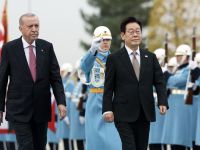The Organization of Petroleum Exporting Countries (OPEC) may cut oil production by a million barrels a day (bpd) to boost prices, its secretary general said Monday.
OPEC ministers meeting on November 14 in Vienna would decide whether to slash output by a million bpd or more if prices plunged further, Ali Rodriguez told a press conference on the sidelines of an Association of Southeast Asian Nations oil conference here.
He said the outcome hinged on the cooperation of non-OPEC members in cutting output in a bid to boost prices that have slumped to two-year lows following the September 11 terror attacks on the United States.
"We will make some decisions in the next conference in Vienna. The first is to ensure full compliance of our committment (to market stabilisation), the second probably is to reduce production again by one million barrels a day," he said.
"But it is very important, extremely important (to have) the cooperation of non-OPEC producers... we need to reduce production again in order to balance the supply with the demand."
Under the present OPEC agreement, member nations are producing about 23 million bpd, he said.
Rodriguez described the current oversupply situation in the global oil market as "transitory" and said he believed the outlook would improve next year.
"We have no concerns about the medium term or long term but we have to fight the problem in the short term," he said.
Asked how far oil prices are expected to fall, Rodriguez said: "That's impossible to say... I am not a prophet but I believe that this is directly related to the performance by the economy.
"I am sure that next year's situation will be a little bit better although the demand will be almost the same as this year."
OPEC has sought the support of non-OPEC producers to cut output to prevent a collapse in crude prices. The 11-member oil cartel has warned of a disaster if non-OPEC producers do not coordinate action.
But major non-OPEC producers Russia, Norway and Mexico have appeared reluctant to commit themselves to specific action.
Rodriguez warned non-OPEC members against taking advantage of the situation to boost their market share because if oil prices collapsed, "we would all suffer the same negative consequences."
OPEC, which produces 40 percent of global crude, would "not fight for market share at this moment," he said.
"It can be a mistake for some countries if they think it is possible to take advantage of the situation and market share because this is only a transitory situation."
He said US plans to boost oil reserves to help guarantee supplies in the event of an emergency as well as stabilize falling prices would not materialise if prices were too low.
"This is a very complex problem and the only conclusion we can have out of this situation is to fight in order to recover the stability of prices," he added.
In his speech earlier, Rodriquez said OPEC members would need to substantially augment oil production capacity in the long-term.
OPEC's 800 billion barrels of reserves make-up about 77 percent of the world's reserves but only account for 40 percent of global output. On the other hand, non-OPEC members have 23 percent of world's reserves but account for 60 percent of total output.
OPEC's reserves are projected to last about 80 years while those of non-OPEC members are expected to be depleted in 20 years.
"The future of global oil supply rests with OPEC," he said.
"In the next few decades therefore, OPEC member countries will need to marshal and invest huge amounts of funds running into billions of dollars in capacity expansion" -- KUALA LUMPUR, (AFP)
© 2001 Al Bawaba (www.albawaba.com)







